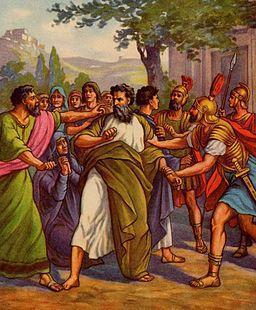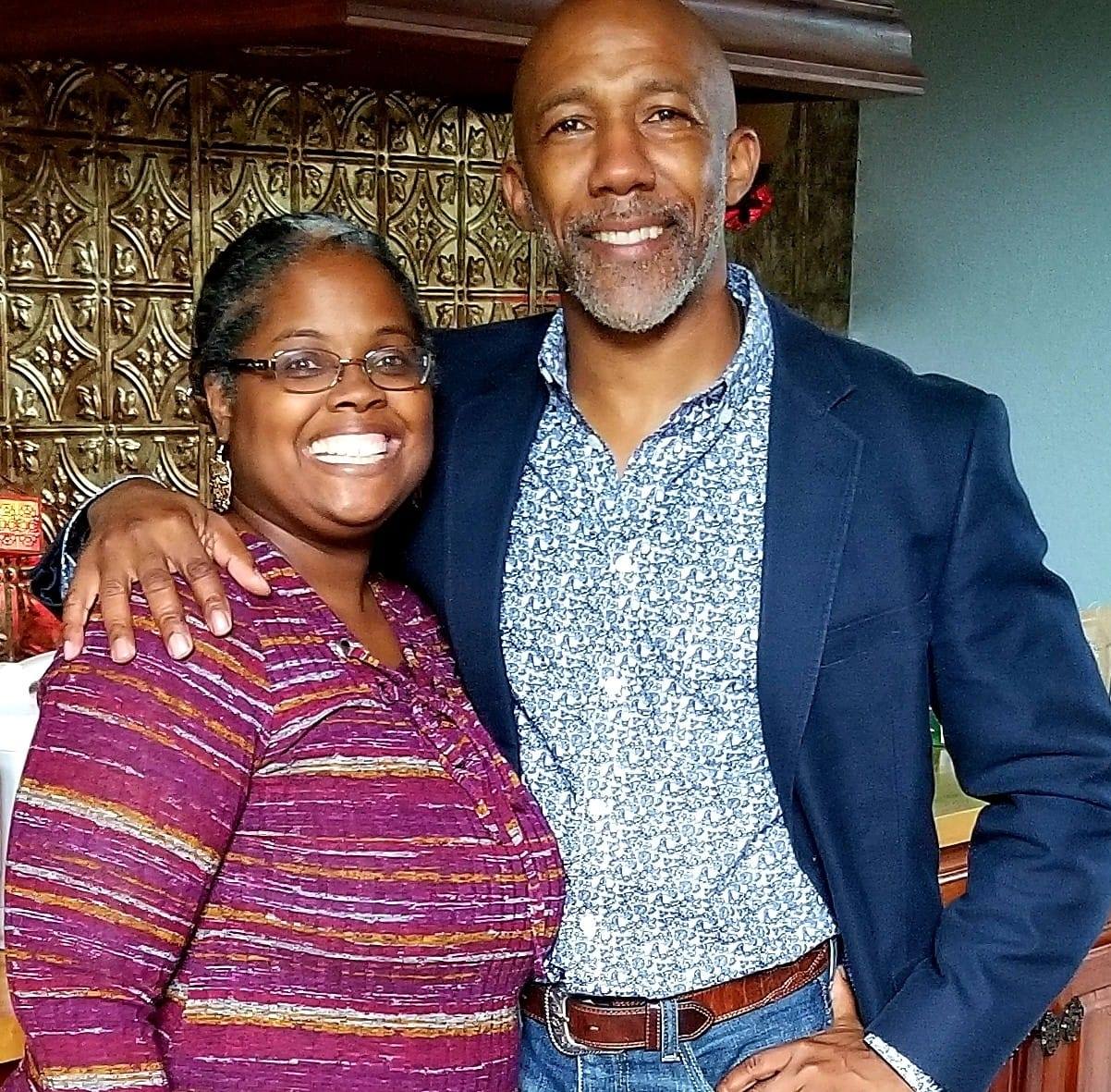Called to Conflict — Part 2 of 3 (Acts 16:19-24)
Introduction
The call to put our faith in Christ is many things. It is a call to forgiveness (Ephesians 4:32; Colossians 1:13-14; 2:13; 3:13; Romans 5:8). It is a call into the family of God (John 1:12-13). God the Father’s pleading to believe on Jesus is a summons to partake in the divine nature (2 Peter 1:4) and the favor and honor that is the inheritance of the Son of God (Ephesians 2:4-7). It is a call away from the futility of fighting God, away from the wanton wasting of time in wickedness, and into life on purpose.
But how often are we told that the call to Christ is also a call to conflict and to suffering. We do new believers a great disservice when we elide the cross from the message about following Jesus. The conflict with the world and suffering cannot be separated from faith and following the Savior. This is what Jesus said:
-
The Promise of Suffering (Psalm 34:19; Acts 9:16; 2 Timothy 3:12) — Paul was called away from fighting against Christianity to be a leading proponent. His calling and conversion was hard for some people to accept. E.g., Ananias respectfully protested the request to meet with Paul after his encounter with Jesus on the road to Damascus. But Jesus insisted and told Ananias that He would “show him how many things he must suffer for My name’s sake.” (Acts 9:16) The Lord made it clear that the cantankerous Pharisee was no longer going to persecute the church; he would promote it. And that Paul was going to suffer. Further, suffering was not going to be optional for Paul — he must suffer. And so it is with anyone that is endeavoring to follow the Son (2 Timothy 2:12).
- The Privilege of Suffering (Matthew 5:11-12; Acts 5:41; Philippians 1:29) — Suffering is often viewed solely as something to avoid or eschew. Pain, says Self and much of society, is a problem to be avoided. But if we look at life through the lens of the Lord’s teachings we get a different perspective. Some suffering is to be seen as a positive sign. This is what Jesus said in His first sermon (Matthew 5:11-12); it is confirmation of our association with Christ. It is an honor that is bestowed on some as a means of bringing glory to the Son. Paul, the one that formerly persecuted the church put it this way in his letter to the Philippians: “For to you it has been granted (ἐχαρίσθη) on behalf of Christ, not only to believe in Him, but also to suffer for His sake…” (Philippians 1:29)
χαρίζομαι: to give or grant graciously and generously, with the implication of good will on the part of the giver (Louw, 1996, p. 568)
-
The Purpose of Suffering (2 Corinthians 4:11; 1 Peter 3:14; 4:13-14) — In conflict and suffering the Jesus follower is given an opportunity to demonstrate the difference that Christ makes in us (Galatians 2:20). There is an apologetic advanced through our handling of reproach and reviling. In our godly and gracious conduct in the face of unjust treatment we put forth an irrefutable argument for the power of the risen Lord. Peter put it this way: “If you are reproached for the name of Christ, blessed are you, for the Spirit of glory and of God rests upon you. On their part He is blasphemed, but on your part He is glorified.” (1 Peter 4:14)
Let us make the most of every opportunity to tell other about the gracious work of God through Christ – the gospel. Anyone willing to turn to the Son of God in faith can have forgiveness, favor, and become part of the family of God. But let us make sure that we tell the whole truth. There is a cross in it. With the decision to follow Christ comes the promise and privilege of suffering for the sake of Jesus. Paul knew this. And he experienced the promise after doing a good work. The good work of delivering a slave girl from the control of a demon.
Selected for Suffering (Acts 16:19-20; 18:2)
19 But when her masters saw that their hope of profit was gone, they seized Paul and Silas and dragged them into the marketplace to the authorities. 20 And they brought them to the magistrates, and said, “These men, being Jews, exceedingly trouble our city;
What mattered most to her masters was that their slave girl was a means for making money. They had worked in collusion with the demon that possessed her as pimps. (Before you castigate me for such a crass description of the business of the masters of the demon, think about what they were doing to the woman.) She was used and made poor while they made a profit.
But Paul’s prayers and command had set her free. And at some point it became obvious to the masters of the slave girl that something was not right with their property. They could readily see (ἰδόντες δὲ οἱ κύριοι αὐτῆς) that she was changed. There may have been many notable changes after the exorcism. One stood out. From their perspective the essential difference was that she was no longer possessed by a spirit of divination. Her abilities as a fortune teller and as a means to making money had had been cast out by the Jews that had recently come to town. They did not ask for her to be delivered and did not appreciate her emancipation:
The good deed done to the slave girl was not at all to the liking of her owners; when Paul exorcized the spirit that possessed her, he exorcized their means of income: she could no longer tell fortunes. (Bruce, 1988, p. 314)
With the spirit the owners’ prospects for further profit also exited. Luke probably intended the wordplay. He used the same verb (exēlthen) for the demon’s coming out in v. 18 as for the money’s going in v. 19. The latter created the problem. Healing a possessed girl was one thing; but when that involved considerable economic loss, that was a wholly different matter. (Polhill, 1992, p. 351)
Upon realizing what had been done the masters are mad. Paul and Silas are both taken to the authorities to answer for their unsolicited help. But, speaking to those us who are more than a little predisposed to notice differences in the way people are treated, only Paul spoke the words that led to the eviction of the evil spirit. The reaction of the masters raises at least two questions. First, why was Silas taken? He had not said anything. Second, why were Timothy and Luke not arrested? The reasons are rooted in both racism and a religious war started by Jesus.
Timothy is only part Jewish; his father was Greek (Acts 16:1). Luke is a Gentile (Colossians 4:10-11, 14). Paul and Silas, as the text later says, are clearly Jews (Acts 16:20). The selection of Paul and Silas was based on a growing national prejudice against Jews. A few years before this event in A.D. 49 or 50 the emperor Claudius issued an edict commanding all Jews to leave Rome. Philippi is a Roman colony of high regard (Acts 16:12) and it is reasonable to assume that the anti-semitic sentiment in that city is strong.
Luke and Timothy were apparently unmolested: Paul and Silas were not only the leaders of the party but also most obviously Jews (Luke was a Gentile and Timothy a half-Gentile). Anti-Jewish sentiment lay very near the surface in pagan antiquity. (Bruce, 1988, p. 314)
What do we say in summary of these two verses?
Whom the Son has set free is free indeed. That is part of the story. Here is the other part: Not everyone is elated with the emancipation of slaves. For some life is better when others are in bondage and the disregard of personhood is a necessary part of using others to make a profit.
The Religious Factor (Acts 16:21-22; Matthew 10:32-39; Luke 12:49-53; James 4:4)

Figure 3 – Are you willing to accept that your reasons for being critical may not be the ones you are talking about? The masters of the slave girl were critical but did not bring up their real reasons for their animosity toward Paul and Silas.
(Acts 16:21–22, NKJV) — 21 and they teach customs which are not lawful for us, being Romans, to receive or observe.” 22 Then the multitude rose up together against them; and the magistrates tore off their clothes and commanded them to be beaten with rods.
From the perspective of the slave masters a good life was lost without hope. Why? Because of some meddling Jewish vagabonds with their gospel and Jesus-based powers. Although the slave owners make no specific mention of the work that destroyed their demonic business they have not forgotten the words of the demon through the girl:
“These men are the servants of the Most High God, who proclaim to us the way of salvation.” 18 And this she did for many days. (Acts 16:17-18)
There were three charges made against Paul and Silas:
- Prejudice – First, with the intent of rousing the animosity of the people around their nationalism, was the charge of being the wrong ethnicity: These men, being Jews. But why do they so hate the Jews. The answer is found in the spirit at work in the world (Ephesians 2:2).
The foremost enemy of God is not glad when a Jew becomes the hope of the world, help for those who will admit their need, and the means by which some will gain forgiveness, favor, future blessing and the strength to destroy the works of the devil. It is no surprise, then, that the foremost enemy of God is at work through the world persecuting that Jew by persecuting those that have become part of His body.
- Disturbing the Peace – Second, although not entirely clear, there was the intimation that the magistrates needed to stop the work of these Jews to exceedingly trouble the city. Contrary to the accusation, peace was actually promoted through the eviction of a demon that was deceiving people and destroying a girl.
- Proselytizing – The third and last charge may have been valid: they teach customs which are not lawful for us, being Romans. They were being accused of the illegal act of proselytizing for Judaism. However, Jews were not expressly forbidden to proselytize until the second century.
The charges were essentially bogus. But when the enemies of God are being influenced by base desires and evil spirits, who needs valid charges to justify mistreating Jesus followers. The desired end was achieved when the crowd rose up against Paul and Silas.
None of the charges were valid, but they had their effect. The appeal to anti-Jewish sentiments and to nationalistic Roman pride won over the crowd (v. 22). The insinuation of a threat to civil order evidently won over the magistrates (v. 23). The magistrates had Paul and Silas stripped for scourging, and the lictors applied their rods. (Polhill, 1992, p. 353)
There was no actual attack of the mob as Paul and Silas were in the hands of the officers, but a sudden and violent uprising of the people, the appeal to race and national prejudice having raised a ferment. (Robertson, 1933, Acts 16:22)
Commanded (ἐκελευον [ekeleuon]). Imperfect active, repeatedly ordered. (Robertson, 1933, Acts 16:22)
When people become difficult as you attempt to do right the reasons may not be rational. Your fight may be with their feelings of insecurity. That is, behind the hostility you will sometimes find that your endeavor toward God-honoring excellence has threatened their ego, their empire, or their economy.
Christians who dare to bring deliverance to the enslaved and exploited are in congruence with Christ. Yay! Those same Christians are in violent and irreconcilable conflict with a world system that actively and aggressively seeks to sinfully subjugate segments of society for selfish gain.
But what are we to think about this particular development? Are Paul and Silas guilty of disrespecting Roman culture? Should they have tried harder not to offend the natives with their Jesus-is-Lord teachings and emotional exorcism? Are you and I experiencing difficulties in our day-to-day because we are puritanical zealots that have taken the Jesus thing too far. I mean didn’t Jesus say blessed are the peacemakers (Matthew 5:9)? One might say that Paul the Conqueror has come in with his gospel message and begun to turn everything upside down. What would Jesus say about all of this? He would say something like, “That’s my, man! Bravo! Keep going, Paul. I am with you and will never leave you nor forsake you.” Roderick, you are putting words in the mouth of Jesus. First, I said he would say something like that. Second, looking at the Scriptures, what He actually said was a lot more incendiary than my imaginings:
Jesus Said He Came to Bring Conflict (Matthew 10:32–39) — 32 “Therefore whoever confesses Me before men, him I will also confess before My Father who is in heaven. 33 But whoever denies Me before men, him I will also deny before My Father who is in heaven. 34 “Do not think that I came to bring peace on earth. I did not come to bring peace but a sword. 35 For I have come to ‘set a man against his father, a daughter against her mother, and a daughter-in-law against her mother-in-law’; 36 and ‘a man’s enemies will be those of his own household.’ 37 He who loves father or mother more than Me is not worthy of Me. And he who loves son or daughter more than Me is not worthy of Me. 38 And he who does not take his cross and follow after Me is not worthy of Me. 39 He who finds his life will lose it, and he who loses his life for My sake will find it.
Jesus’ Apostles Said He Came to Bring Destruction (1 John 3:8) — 8 He who sins is of the devil, for the devil has sinned from the beginning. For this purpose the Son of God was manifested, that He might destroy the works of the devil.
Jesus Said He Came to Bring Division (Luke 12:49–53) — 49 “I came to send fire on the earth, and how I wish it were already kindled! 50 But I have a baptism to be baptized with, and how distressed I am till it is accomplished! 51 Do you suppose that I came to give peace on earth? I tell you, not at all, but rather division. 52 For from now on five in one house will be divided: three against two, and two against three. 53 Father will be divided against son and son against father, mother against daughter and daughter against mother, mother-in-law against her daughter-in-law and daughter-in-law against her mother-in-law.”
Jesus’ Earthly Brother said The Conflict Cannot be Cut Out of Christianity (James 4:4) — 4 Adulterers and adulteresses! Do you not know that friendship with the world is enmity with God? Whoever therefore wants to be a friend of the world makes himself an enemy of God.
What do you do? When you are dealing with a situation like this, know that the real reasons are spiritual and not natural. You will not argue your adversary into being your advocate. The conflict is a consequence of natures that are at odds; they cannot be reconciled. Finally, when you can be certain that you are not doing wrong, accept that this is the cross that comes with following Christ and… press on!
The natural consequence of our conversion is conflict. When we walked according to the course of this world we were collaborators in crimes against God, comrades, colleagues, and companions in companies that conspire against the Lord and His anointed, and in fellowship with those who fight His will. We had peace with the world. But now, especially as we walk contrary to the course of this world, we cannot be at peace with it. We now run counter worldly counsel and have become by our very nature the cause of much trouble. We are by nature at odds with our world and cannot get along. So what are we to do when we realize that our Jesus-following has started a war?
Concentrate on Christ (Matthew 14:25-30; Hebrews 12:1-2) — The desire to do right in the face of opposition is real. But the power to actually do it is from God (Matthew 26:40-43). The ability to endure and emulate the Son is as simple as keeping our eyes on Him. The more we look at Jesus the more we look like Jesus. The gazer is changed in the gazing and we become like that which occupies our attention. One hymns writer put it this way: “Turn your eyes upon Jesus. Look full in His wonderful face. And the things of earth will grow strangely dim in the light of his glory and grace.”α
Congregate with Christ Followers (Hebrews 10:25) — The ideals of self-sufficiency and rugged individualism are great for westerns and over-the-top action movies. In real life we need Jesus and each other; God has so designed the body that the members have need of one another… especially in times of conflict and tribulation. Our resolve to do right even when being reviled is renewed when we gather to encourage one another in psalms, hymns, spiritual songs, the sharing of testimonies, and time in the word. The New Testament knows nothing of the foolishness of a faith that is lived out on couch merely receiving worship and the word at home. Like Jesus we are to leave the comfort of our home to serve others (Hebrews 10:25; Philippians 2:5-8).
In His grip by His grace,
Roderick L. Barnes, Sr.
Notes
α – “The Heavenly Vision”, also known as “Turn Your Eyes Upon Jesus” (the first line of its chorus), is a hymn written by Helen Howarth Lemmel. It was inspired by a tract entitled Focused,[1] written by the missionary Isabella Lilias Trotter. The chorus is widely known, and has become a standard reprinted in many hymnals. Lemmel first published the hymn in England as a pamphlet in 1918, and then included it in a 1922 collection called Glad Songs. It was included in a 1924 American collection entitled Gospel Truth in Song and was widely reprinted in other collections. (Wikipedia, https://en.wikipedia.org/wiki/The_Heavenly_Vision)
stocks – An instrument that secured the feet (and sometimes the neck and hands) of a prisoner (Job 13:27; Jeremiah 29:26). Stocks were usually constructed of wood with holes to secure the feet. They could also be used as an instrument of torture by stretching the legs apart and causing the prisoner to sit in unnatural positions. The Romans often added chains along with the stocks. Stocks were much used in medieval and later times during persecution of Christians. (Freeman, 1998, p. 528)
References
Bruce, F. F. (1988). The Book of the Acts. Grand Rapids, MI: Wm. B. Eerdmans Publishing Co.
Freeman, J. M., & Chadwick, H. J. (1998). Manners & customs of the Bible. Bridge-Logos Publishers.
Louw, J. P., & Nida, E. A. (1996). Greek-English lexicon of the New Testament: based on semantic domains (electronic ed. of the 2nd edition., Vol. 1). United Bible Societies.
Robertson, A. T. (1933). Word Pictures in the New Testament. Broadman Press.
Vincent, M. R. (1887). Word studies in the New Testament (Vol. 1). New York: Charles Scribner’s Sons.




